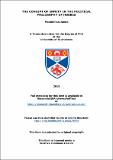Files in this item
The concept of enmity in the political philosophy of Hobbes
Item metadata
| dc.contributor.advisor | Slomp, Gabriella | |
| dc.contributor.author | Jaede, Maximilian | |
| dc.coverage.spatial | x, 236 p. | en_US |
| dc.date.accessioned | 2015-05-22T14:21:48Z | |
| dc.date.available | 2015-05-22T14:21:48Z | |
| dc.date.issued | 2015-06-23 | |
| dc.identifier.uri | https://hdl.handle.net/10023/6679 | |
| dc.description.abstract | To the author’s knowledge, this is the first systematic study of the concept of enmity in the political philosophy of Thomas Hobbes. Examining this important category does not only elucidate the concept itself, but also provides an opportunity to reconnect fragments of Hobbes’s thought that are increasingly being treated as disparate subjects. It is suggested that the notion of enmity can shed further light on related aspects of his political philosophy, including human competitiveness, the roles of fear and trust, the evil of violent death, the status of rebels, and his theory of international relations. In addition, the subject invites a rethinking of Hobbes’s place in the history of political thought. It is argued that he was among the first to make enmity a central subject of political philosophy. This seems to be related to Hobbes’s break with the traditional notion of natural sociability, as a consequence of which he describes the natural condition of mankind as a war of all against all. Although Hobbes depicts human beings as natural enemies, he holds that enmity does not exclude the possibility of reconciliation; individuals can supposedly overcome their hostility through subjection to a sovereign. These views give rise to a dynamic distinction between public and private enmity, according to which outright hostility can be transformed into private rivalry if human beings renounce their natural right of war. Conversely, subjects become public enemies if they rebel against the sovereign. Hobbes’s views on natural enmity and reconciliation also have important implications for his theory of international relations. This thesis particularly highlights the possibility that states can be decomposed and reassembled after a foreign invasion, which precludes wars of annihilation. | en_US |
| dc.language.iso | en | en_US |
| dc.publisher | University of St Andrews | |
| dc.rights | Creative Commons Attribution-NonCommercial-NoDerivatives 4.0 International | |
| dc.rights.uri | http://creativecommons.org/licenses/by-nc-nd/4.0/ | |
| dc.subject | Thomas Hobbes | en_US |
| dc.subject | Political thought | en_US |
| dc.subject | Enmity | en_US |
| dc.subject.lcc | JC153.H6J2 | |
| dc.subject.lcsh | Hobbes, Thomas, 1588-1679--Contributions in political philosophy | en_US |
| dc.subject.lcsh | Hostility (Psychology) | en_US |
| dc.subject.lcsh | Reconciliation | en_US |
| dc.subject.lcsh | International relations | en_US |
| dc.title | The concept of enmity in the political philosophy of Hobbes | en_US |
| dc.type | Thesis | en_US |
| dc.type.qualificationlevel | Doctoral | en_US |
| dc.type.qualificationname | PhD Doctor of Philosophy | en_US |
| dc.publisher.institution | The University of St Andrews | en_US |
This item appears in the following Collection(s)
Except where otherwise noted within the work, this item's licence for re-use is described as Creative Commons Attribution-NonCommercial-NoDerivatives 4.0 International
Items in the St Andrews Research Repository are protected by copyright, with all rights reserved, unless otherwise indicated.


